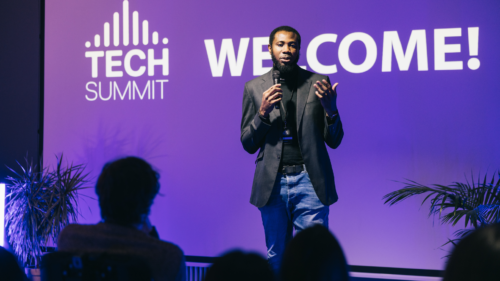
Missed part 1 in this series? Read “How building coalitions can drive financial regulatory reforms” here and part 3 “How to shift private markets to better serve the public interest” here.
Investors have power to shape how corporations act, which is why when we launched our Corporations, Capital Markets and the Common Good strategy, we chose to focus on investment stewardship — the ability of shareholders to influence the behaviors of corporations through dialogue, proxy voting, and board elections.
We know that businesses are so much more than people at the top and those who bank the profits. They require skilled workers to produce goods, informed consumers to buy them, and strong communities in which to grow. We believe all of these actors need to share power in the corporation and receive a fair share of value that they help to generate. Our partners sometimes call this idea stakeholder capitalism — and it stands in opposition to shareholder primacy, the idea that companies should exist purely to maximize investor profits, regardless of the costs to society.
And yet, we think there is huge untapped potential for investment stewardship to change our economy for better, not as a substitute for stakeholder capitalism, but as a part of a broader system of checks and balances. Only a small fraction of people identify with the term “investor.” And yet, the small amount of savings owned by many middle-class people add up to large proportions of the stock market as a whole.
We believe investment stewardship can push Wall Street and corporations to better serve the interests of working- and middle-class families.
Seeing the full picture of the challenges we face
Addressing the climate crisis is essential: corporations and investors can either be a part of the problem, or a part of the solution. Investors concerned about the climate crisis have made front-page headlines in the past few years, most notably, in 2021, when a majority of shareholders ousted three Exxon board members, calling on the company to think more critically before launching new drilling projects.
But the climate crisis is just one of the major challenges our world faces.
For instance, our partners Shareholder Commons and the Finance for Environmental and Social Systemic Change Centre at Cambridge have educated corporations and investors about what will happen if the companies in the meat industry continue to overuse antibiotics. Already, antimicrobial resistance is estimated to cause more than one million deathsannually. Without action, estimates suggest the financial cost in 2054 could be as high as $125 trillion. Investors should be highly motivated to take action — not only to protect the health of people around the globe, but also to protect their own portfolio’s rate of return. In 2021, Shareholder Commons reached a voluntary agreement with Yum! Brands regarding antimicrobial resistance, and in 2023, their work was recognized by the Financial Times editorial board in an article entitled “Investors Can Play Their Part In The Role On Super Bugs.”
Climate and public health are just a few of the issue areas where investors can, and must, make a difference. Over the past two years, many of our partners have been part of achieving major milestones, including the first successful shareholder votes calling for companies to conduct racial equity audits and protect the right of workers to organize.
The need for stakeholder partnerships
As the field of investment stewardship has evolved, we’ve seen that shareholders can’t fully understand the risks or impacts of corporations through data alone. The people who work at a corporation, use the corporation’s products, and live in a corporation’s footprint all possess critical information about what’s going well and what needs to change.
The 2023 Norfolk Southern train derailment in East Palestine, Ohio clearly illustrates why stakeholder voice is so important. For years, transportation trade workers rang the alarm bell about the safety and environmental risks associated with “precision scheduled railroading.” Ultimately, the East Palestine derailment would dump more than a million tons of hazardous chemicals in Ohio; Norfolk Southern’s short-term cost cutting led to irrevocable harm.
What other environmental and human catastrophes could be prevented if workers and community members had more influence over corporate America, directly, and indirectly through closer relationships with investors? And just as importantly — what opportunities for economic transformation are investors missing when they don’t listen to the workers and community members who understand a business’ operations on a personal level?
We’ve witnessed the value of organizations that connect investors with impacted communities. The Interfaith Center for Corporate Responsibility(ICCR) brings investors together with other stakeholders to understand where and how corporations are causing harm and what can be done. In 2023, ICCR investors joined forced with forces with the Walmart workers organized through United for Respect to introduce a shareholder resolution on racial equity.
We’ve also learned from our partner Investor Advocates for Social Justicewho released guidelines in 2022 about how shareholders should collaborate with impacted communities. They’ve called on investors to be transparentabout shareholder tools and the limits of shareholder advocacy; to be participatory, bringing impacted stakeholders directly into their conversations with corporations; and to share decision-making power so that investors and stakeholders have equal say in what the goals of engagement are and how to define a “win.”
Finally, we think it’s critical that investment staff directly engage the working people whose money is invested. In the United States and abroad, most workers who participate in pension funds are also union members. Grantees like Committee on Workers’ Capital and Majority Action have forged strong partnerships with labor unions. We believe pension funds can use their power as shareholders to help change corporate America, and ultimately protect the security of their retirement savings and the future that millions of teachers, firefighters, and other union members wish to pass on to their children.
The path forward
No matter what issue your organization is focused on — from climate change and biodiversity to public health and housing, from labor rights and racial equity to democracy — corporations play an important role. To that end, we believe more philanthropies should consider supporting corporate change and investor oriented work as part of their broader strategy to achieve meaningful change.
Finally, we’ve also come to recognize that corporate accountability and investor stewardship shouldn’t apply just to big public companies. In our next installment of this series, we’ll talk about what the rise of the private equity industry means for our economy, and how investors, grassroots organizations, civil society, and philanthropy can engage.

